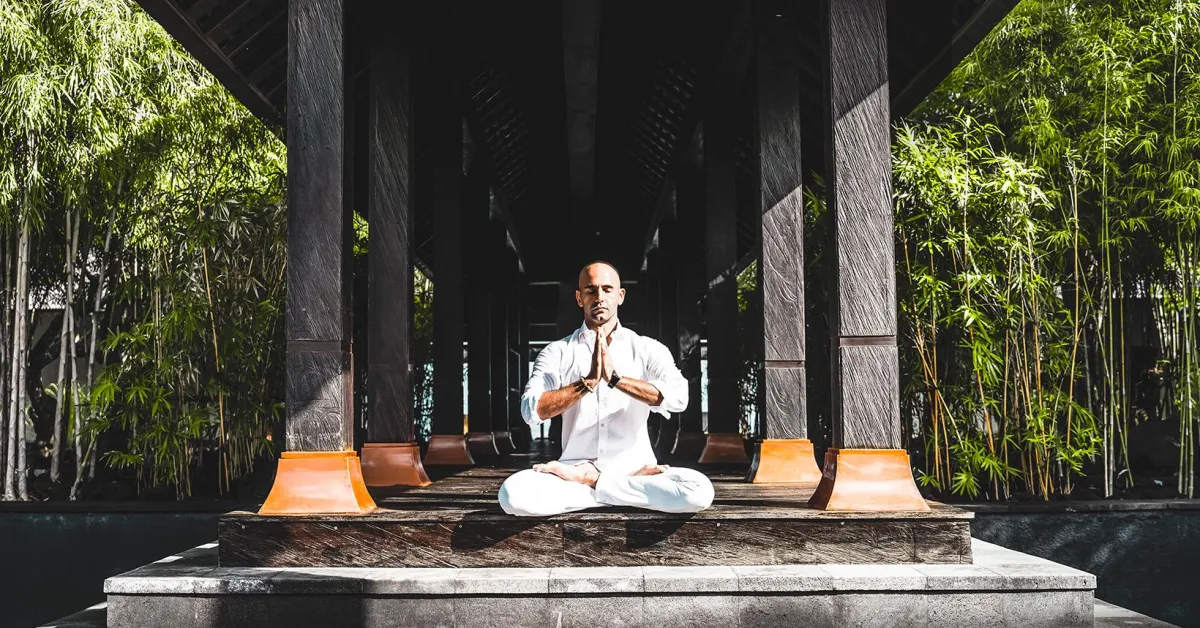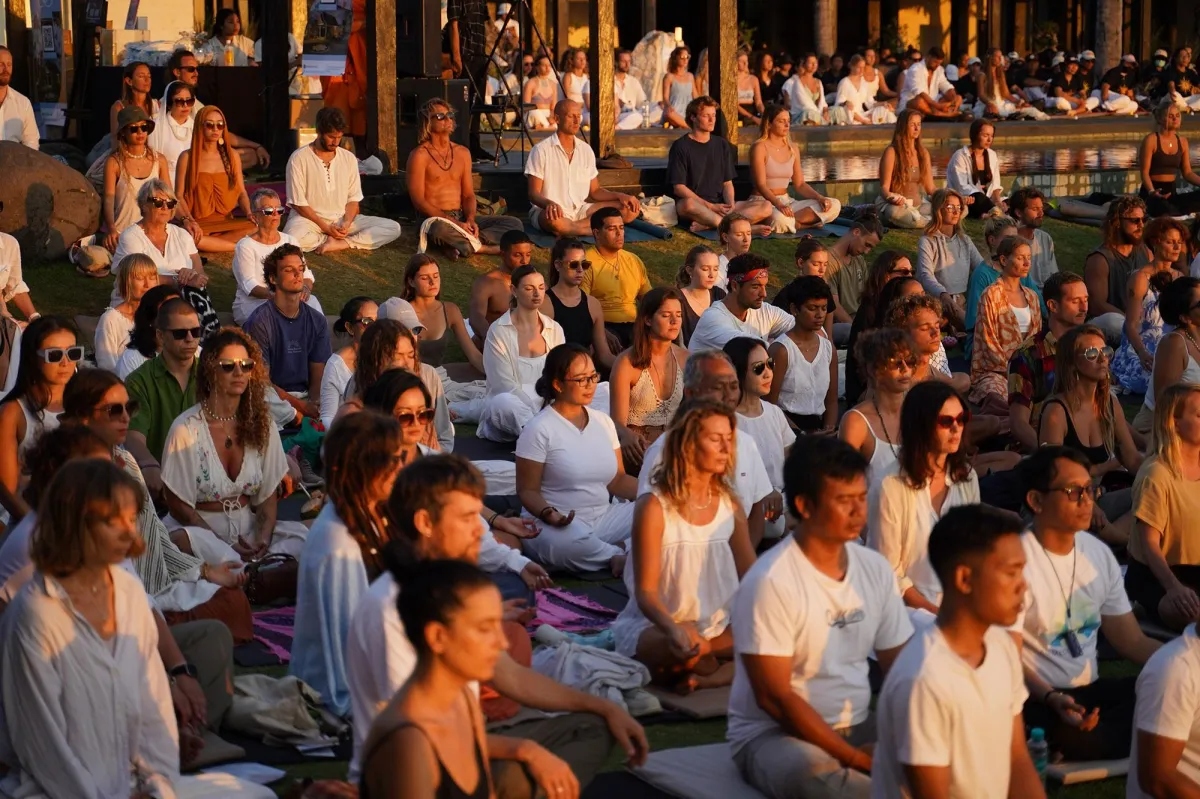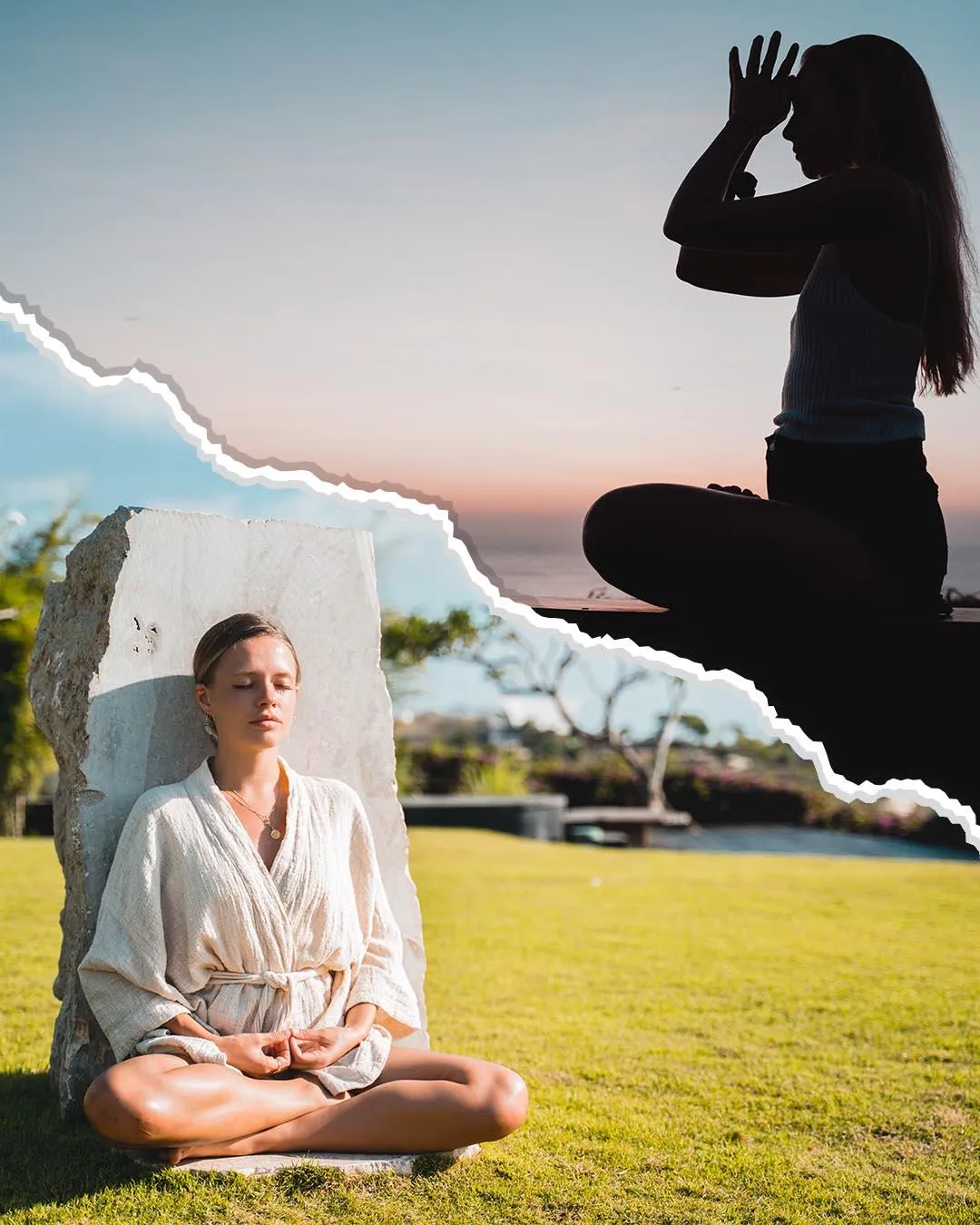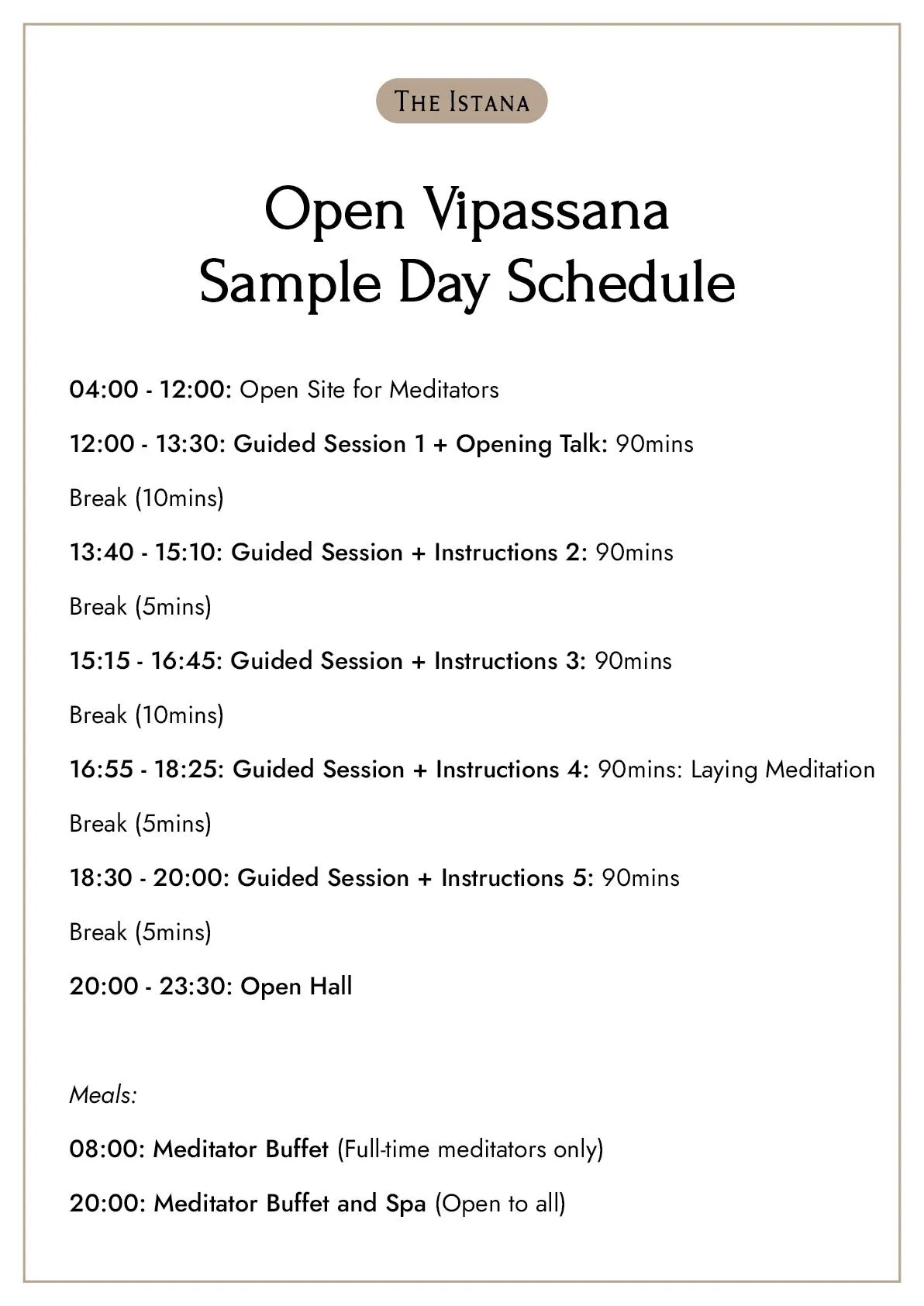Enter the silence, and take what you’ve learned with you
Vipassana Meditation:
Changing Lives Since 500BC
11 - 22 November 2025 @ The Istana, Uluwatu

YogiLab Meditators Worldwide
What is Open Vipassana?
Vipassana allows you to access the depths of yourself. But it can be a challenge bringing these depths back to your life.
The Open Vipassana has been designed to help you master yourself, and train you how to take that mastery home with you.
You may know that Vipassana means to “see reality as it is”. The reality is that you are in control - you always were. In the Open Vipassana you will learn how to become your own teacher, so that you don’t need a perfect mountain-top or another 10 days in silence the next time you lose your way. All you need is the one thing you can never truly lose; your self.
Come practice with us, and never feel like finding yourself is out of your control again.

How Does it Work?
You’ll choose the full-time or part-time schedule.
Full-time meditators will get 8hrs of guided meditation on-site, and 8hrs to choose your own schedule. That could be sauna/plunge-pool time, it could be solitary reflecting and rest, or it can be 8 more hours of self-guided meditation.
Part-time meditators can choose from 1hr30mins of meditation, up to 8hrs of meditation.
Both groups will be in silence during practice times.
Both groups will leave their phones and their worlds behind when they enter the practice area.
The collective practice time will be 12:00-20:00.
The self-guided practice time will be 04:00-12:00.
All full-time students will be trained in how to manage your own practice time, and become your own teachers.
Full-time students will stay on-site and maintain silence for the whole course, part time students are fee to come and go as they please outside of practice time.
Both schedules are run on a donation basis, and all proceeds will go to fund more courses on-site and online.
How Does it Work?
You’ll choose the full-time or part-time schedule.
Full-time meditators will get 8hrs of guided meditation on-site, and 8hrs to choose your own schedule. That could be sauna/plunge-pool time, it could be solitary reflecting and rest, or it can be 8 more hours of self-guided meditation.
Part-time meditators can choose from 1hr30mins of meditation, up to 8hrs of meditation.
Both groups will be in silence during practice times.
Both groups will leave their phones and their worlds behind when they enter the practice area.
The collective practice time will be 12:00-20:00.
The self-guided practice time will be 04:00-12:00.
All full-time students will be trained in how to manage your own practice time, and become your own teachers.
Full-time students will stay on-site and maintain silence for the whole course, part time students are fee to come and go as they please outside of practice time.
Both schedules are run on a donation basis, and all proceeds will go to fund more courses on-site and online.

How Does it Work?
You’ll choose the full-time or part-time schedule.
Full-time meditators will get 8hrs of guided meditation on-site, and 8hrs to choose your own schedule. That could be sauna/plunge-pool time, it could be solitary reflecting and rest, or it can be 8 more hours of self-guided meditation.
Part-time meditators can choose from 1hr30mins of meditation, up to 8hrs of meditation.
Both groups will be in silence during practice times.
Both groups will leave their phones and their worlds behind when they enter the practice area.
The collective practice time will be 12:00-20:00.
The self-guided practice time will be 04:00-12:00.
All full-time students will be trained in how to manage your own practice time, and become your own teachers.
Full-time students will stay on-site and maintain silence for the whole course, part time students are fee to come and go as they please outside of practice time.
Both schedules are run on a donation basis, and all proceeds will go to fund more courses on-site and online.
Sample Daily Schedule
All meditators will be given more details of the rules and systems of the site when they have been accepted onto the course. Here is a basic sample of the schedule:

Frequently
Asked Questions
Not sure about something? Read here first.
What is Vipassana meditation, and how is it different from other types of meditation?
Vipassana means “to see reality as it is”. It is the primary meditation technique that the Buddha taught to help humanity become liberated from suffering. Despite its Buddhist roots, it is an entirely non-religious meditation technique, and guides meditators with practical, explicit steps to do exactly what it says on the tin - liberate humans. It’s been doing this for the past 2,600 years to much success for millions, if not billions of meditators.
You may not have heard of Vipassana, but you definitely would have heard of one of its derivatives, which include: Zen Buddhism, Chan Buddhism, modern mindfulness, CBT, and many of the practices in Tibetan, Thai, and many other forms of Buddhism.
It is, in our humble opinion, the most powerful meditation technique ever gifted to humanity. And you never need to step away from your common sense and practicality to use it. Enjoy the beginning of a long and fruitful journey. We’re excited for you.
How long is this Vipassana retreat, and what does the daily schedule look like?
We have a few different schedules for you to choose from, but our most intense and classic schedule is at least 12hrs 30mins of practice a day in full silence. It’s a good time.
If you don’t feel quite ready for that or have other commitments, we’ve created a few options for you. Sign-up to one of the courses on our app and check out the options.
This live Open Vipassana course is 8hrs of guided practice in silence a day from 12:00-20:00. We’ve intentionally left the gap from 04:00-12:00 to give you the choice of how much to practice, distract yourself, or pick up necessary responsibilities. This schedule is specifically designed to help you govern your own practice, and learn how to navigate meditating whilst also being in charge of your own time - which is one of the classic challenges meditators face when leaving full-time retreats.
Do I need prior meditation experience to join this retreat?
No, Vipassana meditation is a comprehensive practice, and you will learn everything you need on the course. It can be challenging, because by its very nature Vipassana points you directly in contact with yourself and allows you to go as deep as you’re ready for. But this is the same challenge that everyone will face, and it’s for each of us to decide how deep we want to go.
Be ready to face yourself and everything you could possibly feel, and you’ll be fine. In fact, it could be the beginning of the deepest and most transformative experience of your life.
Is this a silent retreat and why is it important?
Yes, it is a silent retreat for all students while they are on-site. For full-time students, this will be all day. For part-time students, you will have your own schedules, and it is intentionally your choice how much you engage with the silence when you are not on-site.
It’s important, because silence allows you:
1. To become sensitive to yourself.
2. To process the internal habits you’ve accumulated without flooding yourself with more noise.
Silence is the container that will allow you to dive deeply into yourself quickly in a condensed period of time. Use it effectively.
Are accommodation and food provided?
For residential students, accommodation and food are provided. For everyone else, we recommend you stay within walking distance of the site, or an easy drive away. We will have a meditator buffet provided for the residential students twice a day. Other students can choose to join these buffets too. Speak to the on-site staff to arrange this.
Can I leave the retreat early if it feels too difficult?
Yes, you are of course your own master. But if you have any doubt over whether you will complete the retreat, then do not apply for one of the full-time options, as we only have a limited number of spaces and these are reserved for meditators who want the full, immersive experience.
It is also worth noting that the retreat will most definitely feel difficult. It is part of the nature of Vipassana that over time we will be placed in direct contact with the totality of ourselves. This can include the aspects we find confronting. If we face these, we can dissolve deep-seated habit patterns and truly transform a lifetime of what we’ve been carrying and has been holding us back. So, after the difficulty comes a massive reward. To say that it would be a shame if you gave up at the difficulty phase is a vast understatement.
Also, you might be interested to know that my sixty-something-year-old mother, who can have trouble walking and sitting, has done 4 Vipassana retreats. She didn’t quit once.
What are open seats & how do I book them?
Open seats are meditation spots available to be reserved by part-time students. They will be behind the seats of the full-time students to stop any meditators coming in and out from disturbing their practice.
If you apply for the part-time course and are accepted, you will be sent information on how to book your space and time.
Are there any restrictions on reading, writing, or using electronic devices?
For full-time students, reading, writing, electronic devices and other forms of stimulation are all prohibited. This is to stop the students from being tempted to engage with anything other than the meditative process.
For part-time students, when you leave the site you are your own master and can do whatever you want. This will give you the opportunity to see how you can blend meditation into the life you have chosen.
What should I bring with me to the retreat?
Enough clothes, toiletries, and willpower to see you through the 10 days.
How do I prepare myself mentally and physically before attending?
A lifetime of disciplined practice and a well-lived life exposed to all the flavours of the world and aspects of yourself would be preferable. However, one common misconception is that you need prep to do this. Actually, all the prep you need will be given to you on the course - it is the beginning of what will be an amazing lifelong journey for you.
There are some basics it is good to prep with that might help you have the best experience, though:
1. A desire to genuinely connect with yourself and untangle the knots and habit patterns made over a lifetime.
2. A baseline level of flexibility.
3. No coffee, tea, stimulants, alcohol, drugs, or meat for two weeks before the retreat.
4. A will to face whatever comes up and deal with it within the framework of the practice.
What kind of transformations or benefits can I expect after completing the retreat?
Arthur C. Clarke said that “any sufficiently advanced technology is indistinguishable from magic.”
Vipassana is one such sufficiently advanced internal technology. If taken to completion, it will start to look like practical steps to magic.
To get there, you will need to face the habit patterns you have hardwired into yourself. The technique will teach you how to let these unwind and stop repeating them. This will allow you to come to a point where you are released from the habit of being “yourself”. That on the other side, you will see was actually a construct you created through repeated mental, emotional, and physical action - eventually imprisoning you. Once liberated from even a few habits, you will realise that these were never truly you, but simply actions you consistently repeated. What you find underneath will be a version of you free of one layer of self-imposed chains.
The methods you will learn to be able to do this will give you other side benefits; focus, creativity, pattern recognition, peace, competence.
It’s a beautiful path. I’m excited for you, and I truly hope you enjoy the journey as much as I have.